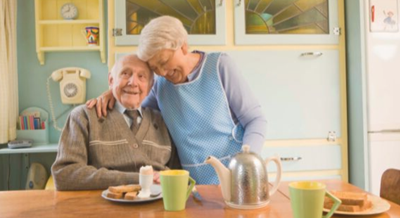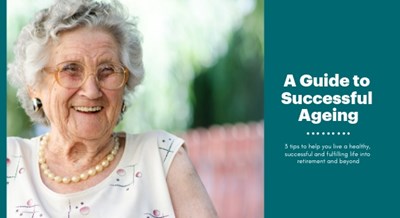The Psychology Department in St Patrick’s Mental Health Services (SPMHS) is passionate about increasing access to psychological therapy for older adults.
Psychological therapy is a way of treating mental health difficulties. It aims to help the person understand the origins of their mental health difficulties and develop strategies to ease the pain that these difficulties can cause.
There are a number of barriers to older adults accessing psychological therapy, including myths or misconceptions about our ability to change and to learn new ways of coping and relating to ourselves as we age.
Our Psychology Department believes that no-one is too old to learn new ways of coping and lessening the pain that mental health difficulties can cause. We believe that psychological therapy can be beneficial across the lifespan; this view is supported by research that has found that older adults respond better to psychological therapy than working-age adults.
We provide a range of group-based psychological therapy programmes, which can be accessed by older adult service users who are attending SPMHS on either an inpatient or day patient basis.
We are also pleased to be able to accept referrals for these programmes directly from GPs, community mental health teams and geriatricians. More information on how these groups can refer to these programmes and the steps that follow is available further below.
You can find out more below about each of these programmes.
Compassion-Focused Therapy for Older Adults
The Compassion-Focused Therapy for Older Adults (CFT-OA) programme is designed for older adult service users who experience high levels of shame and self-criticism which sustain their mental health difficulties.
The programme is aimed at service users who are motivated to work on their issues with other people within a group setting. Through this setting, service users learn both how to understand their difficulties and how to relate to themselves in different ways. They become enabled to better engage with their distress and to ease that distress by becoming more self-compassionate.
Service users in the CFT-OA programme learn about and practice exercises in compassionate imagery, address self-critical ways of thinking, and determine more compassionate behaviours which advance towards desired changes.
The group usually meets in person on one day a week across a period of five to six months.
Referrals to CFT-OA can be made by psychologists in our multidisciplinary teams (MDTs) here in SPMHS, or directly from GPs, community mental health teams and geriatrician following the process outlined further below. If, following assessment, the CFT-OA programme is deemed a good fit for the older person’s mental health needs, the referral will be passed to the CFT-OA team. The CFT-OA team will then, in turn, contact the person to discuss the CFT-OA programme in more detail.
For more information, you can read the CFT-OA brochure.
SAGE
SAGE is a psychological therapy group for older adults who are experiencing difficulties with their mental health.
The group programme is adapted from psychological theories about how some coping styles can impact on mental health difficulties.
SAGE is tailored towards people who identify with a pattern of:
- suppressing their emotions
- maintaining a rigid set of standards and routines
- keeping a distance in relationships and avoiding closeness.
The programme is run by a team of two psychologists and an assistant psychologist, with both in-person or remote access available. It is held across 18 group sessions, which take place for a half-day once a week, along with an individual session which takes place midway through the programme.
SAGE is open to older adult service users under the care of an MDT here in SPMHS. If you are attending SPMHS and are interested in taking part in the programme, please speak to your MDT; the psychologist on your team can meet with you to assess if the programme would be a good fit for you.
We also accept referrals from GPs, geriatricians, and community mental health teams, through the referral process described further below. If SAGE is found, through an assessment after such a referral, to suit your mental health needs, you will be invited to attend a "taster" day to meet the team and see what is involved in attending the programme. Together with the SAGE team, you can then decide if this programme would be helpful for you.
See the SAGE brochure here for more information.
Living Well with Mild Cognitive Impairment
Living Well with Mild Cognitive Impairment is a group programme for people with Mild Cognitive Impairment (MCI).
People with MCI usually notice that they have difficulties with some areas of their cognition. The term "cognition" describes a number of mental processes involved in thinking, learning, and understanding. For example, the person may notice difficulties in their thinking, language, memory, attention, problem-solving, planning or organising. They may also notice some difficulties with their everyday activities. MCI is also associated with an increase in anxiety and depression and a decrease in psychological wellbeing.
This group programme offers support for people in managing the emotional, cognitive, and practical elements of the MCI diagnosis. The aim of the group is to help people with MCI to achieve important goals and maximize their cognitive abilities. It covers topics such as education on what MCI means, psychological coping skills, and cognitive stimulation and rehabilitation strategies.
The group, which is run by two psychologists and one assistant psychologist, is usually made up of six members. It is held in-person in St Patrick’s University Hospital. The group takes place over 10 weeks: there are eight weekly group sessions, and two individual sessions with a psychologist (one midway through the group and one at the end of the group).
If you are an older adult receiving care in SPMHS and feel this group would be suitable for you, referrals can be made through your MDT. Please contact your consultant if you would like to be referred; they will link you in with your team psychologist who will decide whether the referral would be suitable for you.
If you are not receiving care in SPMHS, you can also be referred by a GP, community mental health team, or geriatrician: more information on how these groups can make referrals is shared below. If you are referred this way, you will be invited to an assessment. If the assessment finds that the Living Well with Mild Cognitive Impairment programme would fit your needs, you will be invited to attend a further assessment appointment, where you will meet with one of the group facilitators and see what the programme involves. You can then decide together with the programme team if the Living Well with Mild Cognitive Impairment programme would be helpful for you.
See the Living Well with Mild Cognitive Impairment brochure here.
Older Adult Formulation Group
What is the Older Adult Formulation Group?
The Older Adult Formulation Group has been specifically designed for those who are aged 65 years and over and who are interested in developing a psychological understanding of their mental health difficulties. In the formulation group you will develop your formulation with the support of two psychologists, an assistant psychologist and the other group members.
What is a formulation?
A Psychological Formulation is a way of understanding your life story by reflecting on your background, life experiences and ways in which you learned to cope. It explores some of the valid reasons why you are struggling, distressed or feeling stuck. The emphasis is on noticing triggers and patterns in your life, as well as acknowledging strengths and how you can build on these to enhance wellbeing. When you have gained a greater understanding of your formulation, you may have a greater sense of what you need to soften the beliefs, coping strategies and patterns that are leading to suffering today.
What is the structure of the group?
The group takes place in-person at St Patrick’s University Hospital, Dublin 8, from 10:00am to 1.00pm every Thursday. The group usually consists of 6-10 group members and is facilitated by two psychologists and one assistant psychologist.
The group takes place over 14 weeks. There are 12 weekly group sessions. There are also two individual sessions with a psychologist: one midway through the group and one at the end of the group. These individual sessions provide an opportunity for you talk about your experiences in group, your formulation and what might be helpful when the group ends. Any recommendations that are made during the final individual review session will be communicated with your team.
If you are interested in attending the Older Adult Formulation Group, you can discuss it with your team in St Patricks Mental Health Services. Your team psychologist will then meet with you to talk about the group and complete the referral. GPs, community mental health teams and geriatricians can also make referrals to older adult psychology day programmes. Referrals can be made using referral forms on stpatricks.ie or by contacting the Referral and Assessment Service by email: referrals@stpatricks.ie
Referrals
Older adult service users already attending SPMHS can discuss with their MDT if they would like to be referred to one of these programmes. The psychologist on their MDT will meet with them to discuss this and see if the referral would be suitable for them.
Referrals to these programmes can also be made by GPs, geriatricians, and community mental health teams through our usual referral pathways. In these cases, we ask the referrer to mark the referral as being for “Older Adult Psychology Programmes”. The person referred will be offered an appointment for an assessment with a member of the team of psychologists who run the older adult psychology programmes to explore which programme is likely to meet the needs of the person and to direct the referral based off that assessment.
For queries about these programmes or referrals to them, please contact Dr Karen Looney, Principal Clinical Psychologist and Neuropsychologist, by calling 01 249 3403.




